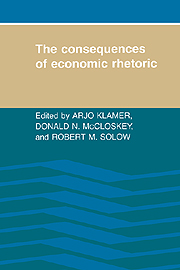Book contents
- Frontmatter
- Contents
- Preface
- The consequences of economic rhetoric
- PART I ECONOMIC RHETORIC: INTRODUCTION AND COMMENTS
- PART II ECONOMIC RHETORIC: FURTHER ARGUMENTS
- PART III ECONOMIC RHETORIC AMONG ECONOMISTS
- 9 Shall I compare thee to a Minkowski–Ricardo–Leontief–Metzler matrix of the Mosak–Hicks type? Or, rhetoric, mathematics, and the nature of neoclassical economic theory
- 10 On the brittleness of the orange equilibrium
- 11 The significance of significance: Rhetorical aspects of statistical hypothesis testing in economics
- 12 The rhetoric of self-interest: Ideology of gender in economic theory
- PART IV ECONOMIC RHETORIC IN POLITICS AND JOURNALISM
- PART V ECONOMIC RHETORIC: ITS RHETORIC AND ITS CONSEQUENCES
- 1 Appendix: Other contributors and participants
- Index
10 - On the brittleness of the orange equilibrium
Published online by Cambridge University Press: 07 September 2010
- Frontmatter
- Contents
- Preface
- The consequences of economic rhetoric
- PART I ECONOMIC RHETORIC: INTRODUCTION AND COMMENTS
- PART II ECONOMIC RHETORIC: FURTHER ARGUMENTS
- PART III ECONOMIC RHETORIC AMONG ECONOMISTS
- 9 Shall I compare thee to a Minkowski–Ricardo–Leontief–Metzler matrix of the Mosak–Hicks type? Or, rhetoric, mathematics, and the nature of neoclassical economic theory
- 10 On the brittleness of the orange equilibrium
- 11 The significance of significance: Rhetorical aspects of statistical hypothesis testing in economics
- 12 The rhetoric of self-interest: Ideology of gender in economic theory
- PART IV ECONOMIC RHETORIC IN POLITICS AND JOURNALISM
- PART V ECONOMIC RHETORIC: ITS RHETORIC AND ITS CONSEQUENCES
- 1 Appendix: Other contributors and participants
- Index
Summary
I want you to remember that words have those meanings which we have given them; and we give them meanings by explanations.
Ludwig Wittgenstein, The Blue BookThe proof … changes our concepts. It makes new connexions and changes the concept of these connexions.
Ludwig Wittgenstein, Remarks on the Foundations of Mathematics“Equilibrium”
Mathematical economists are members of an interpretive community (Fish 1980). It is sometimes suggested that the creation of mathematical texts in economics is associated with the community's desire to avoid serious issues of interpretation: Mathematics is thought to produce a text that allows little or no variability in a reader's response (e.g., a real number is not a metaphor). My own argument, however, will show that a mathematical text established one of several competing interpretations and forced readers to select one image from a set of images; mathematical work has in at least one case shifted economist-readers’ use of a word.
At issue is the word equilibrium and how its meaning evolved in a sequence of papers published between 1939 and 1954. Although equilibrium is a term that appears in the hard core of the neo-Walrasian program, and hard core suggests linguistic fixity, that connotation is misleading. I am not, of course, interested in the “true” meaning of equilibrium. I am instead interested in how an interpretative community read the word equilibrium over a fifteen-year period. In McCloskey's terms (1983, 1986) one must examine the rhetoric associated with some writings about equilibrium. Unlike his case studies of purchasing power parity, and unlike Robert Fogel, I want to study change, to paint over the austere Lakatosian landscape with the bright colors of language.
- Type
- Chapter
- Information
- The Consequences of Economic Rhetoric , pp. 146 - 162Publisher: Cambridge University PressPrint publication year: 1989
- 1
- Cited by

